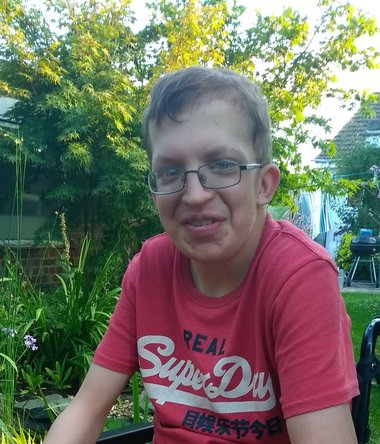22 February 2018
One of the first patients to sign up to the 100,000 Genomes Project has received a diagnosis for his rare genetic condition after years of speculation.
Alex Masterson [pictured] was originally diagnosed with Noonan syndrome, a genetic disorder that can cause heart defects and distinctive facial features, when he was five years old, but he did not have a mutation in the genes usually known to cause the condition.
Through the years Alex has had 28 operations including the removal of multiple benign tumours, several bouts of heart surgery, stomach surgery, dental work and operations on his feet.
Dr Melita Irving, Consultant Clinical Geneticist at Guy’s and St Thomas’ NHS Foundation Trust, told the family about the 100,000 Genomes Project in 2014 and they enrolled Alex straight away.
The project involves sequencing 100,000 genomes from people who have a rare disease or cancer. Your genome is your body’s instruction manual. It is made up of DNA and there is a copy in almost every cell. The aim of the project is to create a new genomic medicine service for the NHS –
transforming the way people are cared for.
Sequencing of his genome revealed that Alex has a related rare genetic disorder called Leopard syndrome, also known as Noonan syndrome with multiple lentigines (NSML).
Dr Irving said:
We had reached the limits of the genetic tests available and we still had no answers for Alex and his family as to why this was happening to him, so when the 100,000 Genomes Project came along we leapt at the chance to enrol Alex.
The project is transforming genetic testing in the NHS, not just for families with a rare disease like Alex, but also for people with cancer and other medical conditions, helping to inform decisions about the most effective treatment for them.
Guy’s and St Thomas’ NHS Foundation Trust leads the South London Genomic Medicine Centre, which involves King’s College Hospital, South London and Maudsley and St George’s University Hospitals NHS Foundation Trusts.
The King’s Health Partners Genetics, Rheumatology, Infection, Immunology and Dermatology Clinical Academic Group promotes academic input into the delivery of state-of-the-art clinical services, fuels investigative clinical research, and promotes the translation of basic science discoveries.





